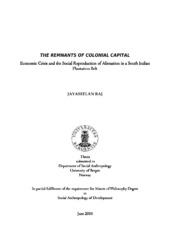| dc.description.abstract | This dissertation is concerned with the present-day situation of Tamil tea plantation workers in Kerala. The plantation Tamils, as they are known locally, belong to Dalits (ex-untouchable/outcaste) communities who have been segregated within Indian society and were kept out of socio-economic progress for centuries. This outcaste social status allied with the identity of coolie - a lower category of manual labour - provided a perfect combination to stigmatise their life and confine it into the insulated space of plantations. The recent economic crisis in Indian tea industry that led to temporary closure of many plantations further deteriorated their life. The closure of the plantations forced many of the workers to seek work outside the plantations. Those who decided to stay back sustain through trade union dictated plucking and selling of tea leaves in the closed plantations and through weekly pocket money (which will deducted from monthly payment of the wages) in the partially working plantations. This new situation became a decisive moment for the plantation workers as it put them in an unusual situation where they have to cope-up, renegotiate, and rethink their life in relation to the crisis, à la survivors of any natural calamities. This is a situation when a state of exception is prolonged to an ordinary state of existence (Agamben 1998) where the crisis continues to be an imagined spectre under which the plantation workers partially experience their life today. The major focus of the research is to identify and delineate the changing nature of the alienation and marginality of the plantation workers in a situation where the nature of plantation as a total institution break down and the workers living in an insulated space of the plantation are exposed to the outside world. My argument is that the workers' alienation in the crisis-context is underpinned in three major processes; a). Exposure of workers to the caste- ridden outside society b). Transformations in the workers' relation with plantation management, trade unions and State; and c). Reintegration of the workers into Dalit migrant workforce outside the plantation system. Accordingly, I contend that the social reproduction of workers' alienation in the crisis-context could be delineated by understanding these processes. | en_US |
